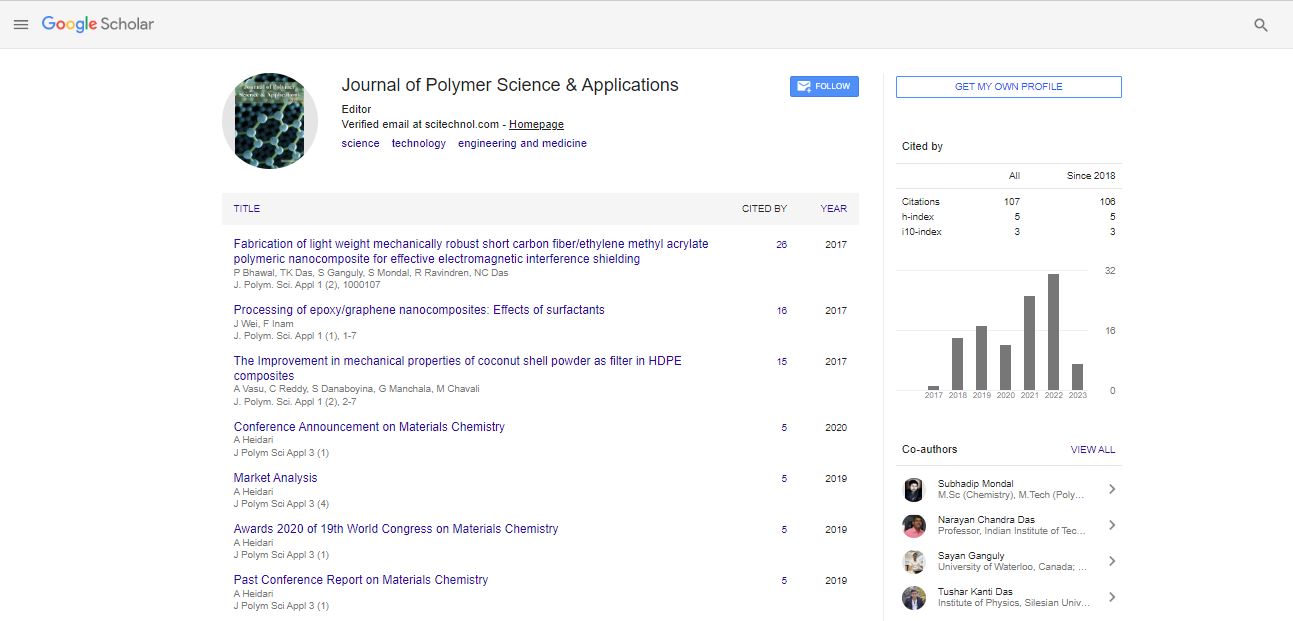Street drugs as from the height of ecstasy to the depths of hell: As quick as a flash
Dhrubo Jyoti Sen
Techno India University, India
: J Polym Sci Appl
Abstract
From the height of ecstasy to the depths of hell: as quick as a flash. Then brain damage for the rest of your life. This is what some street drugs can do to you and even after you've stopped, these drugs may have scorched the delicate tissue of your brain and changed you into a monster, capable of the most horrifying acts of violence. Or you might be left in a dark well of depression, from which nothing can save you. It doesn't matter which drug you try, even if it's only once - you have to know you're playing with fire. The stuff you're smoking, sniffing or shooting up is going to hit your brain with the force of a lightning bolt. It's not the moral custodians, teachers and religious ministers who say so. It's hardened policemen, chemical scientists and psychiatrists who have witnessed the effects of these drugs with bewilderment. Forget everything you thought you knew about drugs. Nothing can prepare you for the havoc caused by Charlie and crystal, hot ice, china white and liquid ecstasy and it's not happening somewhere else; it's happening here in our neighbourhoods, schools and universities, to normal teenagers who "just wanna have fun" and adults who should know better. It makes the druggedhippie era look like a Sunday school picnic. Modern drugs are so much more powerful, so much more intense, taking you to ecstatic peaks of euphoria and energy - then dropping you into the depths of despair. No wonder it's called a crash. Until recently no one knew the extent of the devastation caused in your brain by this chemical violence. Illegal drugs are drugs which have legal limitations on their ownership or use. They are illegal in certain situations (meaning a person is not allowed to have them). A drug is any chemical that affects the human body or mind when it is swallowed, breathed in, or consumed in another way. A psychoactive drug is a drug that affects the brain. Most laws against drugs are against psychoactive drugs. Some controlled drugs are allowed if you have permission (called a "prescription") from doctor. Other drugs are illegal—meaning you are never allowed to have them. Individual countries and places have different laws about different drugs, and there are also international treaties against some drugs. The most used drugs are not illegal, for example tobacco. Drugs, legal or not, may be taken many ways. Different drugs can be used in different ways, depending on the drug. Some drugs are available in different forms and each form can only be used a certain way - for instance crack cocaine (cocaine in a base form) is more powerful when smoked or vaporized, and powder cocaine (cocaine in a salt form) is usually snorted. Drugs can be taken: Orally - This means they are put into the mouth and swallowed, for instance a pill. Smoked - This means the drug is burned and then the smoke that is produced is inhaled in by the user, for instance through a pipe, bong, cigar or cigarette. Insufflated - This means the drug is snorted up a person's nose. Vaporized - This means a drug is heated up until it turns into a vapour, then the vapour is breathed in. Sublingually - This means the drug is absorbed through the vein under a person's tongue. Buccally - This means the drug is absorbed through a person's cheek. Intravenous - Also called IV - this means a drug is injected into a person's veins using a needle. Intramuscular - Also called IM - the drug is injected into a person's muscle using a needle. Rectally - This means the drug is put into someone's anus and absorbed there - usually via something called a suppository. Transdermally - A few drugs, such as nicotine and fentanyl, can even be absorbed through a person's skin. Orally is the slowest method of using a drug as it must be digested in the stomach first. Injecting a drug (IV) is the fastest and the most likely to lead to an overdose. Keywords: Uppers, Downers, Hallucinogens, Euphoria, Psychedelics.
Biography
Dhrubo Jyoti Sen completed his Postgraduate research work on MPharm. Project entitled as “Industrial problems in manufacturing of guaiacol from o-anisidine and manufacture of m-nitrobenzaldehyde; a drug intermediate” was performed by GATE scholarship in the laboratory of Medicinal and Pharmaceutical Chemistry under the guidance of Late Prof. (Dr.) Samir Chandra Lahiri in the Department of Pharmaceutical Technology, Jadavpur University, Calcutta.
 Spanish
Spanish  Chinese
Chinese  Russian
Russian  German
German  French
French  Japanese
Japanese  Portuguese
Portuguese  Hindi
Hindi 